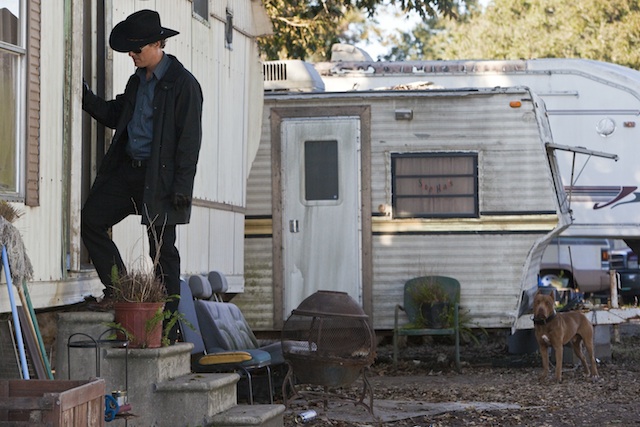Killer Joe
18Matthew McConaughey is quite the curiosity. Throughout his career he's been sold to audiences as a proper A-list actor, without actually having an A-list CV to back it up. That's not to diminish his abilities as an actor, but he's clearly not a name that can open a film big. In fact try to name another leading actor that has made as many mediocre films. Or you can come at it the other way; try and name an excellent McConaughey film. That's right, it can't be done.
Here the actor teams up with a director who, in all honestly, has made a career from only two excellent films (1971's The French Connection and1973'sThe Exorcist). Everything else William Friedkin has directed since has been decidedly average.
So with a poor track record from both director and leading man, expectations are low where this title is concerned. In retrospect, they should have been far lower.
Times are hard for young Chris (Emile Hirsch); he's got himself into a bit of a fix with a loan shark and he needs to pay him back quickly. Unfortunately, he doesn't have that kind of cash. And as they say, desperate times call for desperate measures.
He learns that his mother has a hefty life assurance policy, which he believes is made out to his younger sister Dottie (Juno Temple). He tells his dad Ansel (Thomas Haden Church) about this and then informs him that he knows a guy that will kill her for them. Now, Ansel is divorced from his wife and is currently married to waitress Sharla (Gina Gershon); he and his ex haven't been that close for a while. So when his son tells him of his plan to have her killed he can't see anything wrong with the idea, especially when he's in for a quarter of the cut.
It turns out that the guy Chris has in mind to do the job is no ordinary gun for hire; Joe Cooper (McConaughey) is a cop. And Joe is more than happy to take the job on. The problem is, he likes to be paid up front for his extracurricular work outside of the police force, and Chris clearly doesn't have it. After seeing his sister Dottie however, Joe says he'll accept her as a retainer. Chris agrees. After all, surely this was the easiest risk-free proposition; what could possibly go wrong?

I know my career isn't what it used to be, but this has to be the worst trailer I've ever had.
You can tell how appealing this script must have been for the actors. It's a rich, character-driven piece adapted from Tracey Lett's first play of the same name from 1993. The problem is, it may have had a lot of impact on stage at the time, but it just doesn't work on the big screen.
It seems to have fallen into the trap that just because it's set in a state (Texas) with an interesting accent, all the dialogue automatically becomes interesting. Wrong. Writing dialogue has improved since then, and you only have to look at the small screen to see that. One show that stands out in terms of utilising a regional dialect is Timothy Olyphant's Justified. The difference being however, is that the show's dialogue is sharply written with it, based as it is on Elmore Leonard's Fire in the Hole. It doesn't use the accent as a crutch, as it's used in Killer Joe, but instead uses it to accentuate the lyrical nature of the dialect.
It's not helped by a having a set of characters that are difficult to care about either. A lot of filmmakers recently have made the same mistake, and it looks like no-one is going to learn from it any time soon.
That's not to say that all characters have to have something likeable, but they have to have something for an audience to react to them one way or another. And if they couldn't care less about your characters one way or another, you're in trouble.
In order to address this, Friedkin has decided to pull his David Lynch card out. By doing so, he turns one of his characters – the titular character played by McConaughey – into a Twin Peaks reject. Joe is an interesting character for sure, but his darkness is turned all the way up to compensate for the dreariness around him, and the film is completely unbalanced because of it.
The film relies on one or two scenes of gratuitous violence in order to stir an audience from the numbness of everything around it. But they really are nothing more than too little too late.
The two brightest lights in a poorly lit-room are Gershon and Temple; both dig deep into their characters and deliver strong and notable performances.
To be fair, McConaughey gives considerably in his role, possibly digging deeper into the darker recesses of a character than he's ever dared go before. But it's lost on a sour effort like this.
Friedkin however, once again proves that whatever talent he once had has long since left him.
Killer Joe attempts to be edgy and revel in the indie cool of years gone by, but somehow manages to miss the mark in every way possible.
One thing it does do however is continue McConaughey's career path along the long, well-travelled road of mediocrity.
